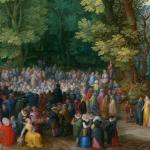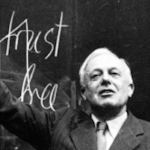Matthew Levering devotes a dense chapter of his Engaging the Doctrine of Creation to a defense of divine simplicity. As one would expect from a leading Catholic thinker, Levering relies on Thomas.
God, Levering argues, must be pure act in order to be something other than “a being among beings”: “God can be the source and cause of all finite being, the creator, only if God ontologically transcends all finite being. If divine being were finite, God could not [in Thomas’s words] ‘produce [finite] being absolutely,’ since no finite ‘being can produce a being absolutely, except forasmuch as it causes being in this‘” (93).
Finite causes can cause being to exist as this or that; finite causes cannot cause a being to exist. Granting that point, the question remains: Why is simplicity the mark of the difference between finite and infinite being?
God isn’t “composite in the sense of being bodily or temporal,” but, Levering asks, is it possible that God might be composite in another way?
He offers some suggestions: “could God live by his life or be God by his Godhead (or divinity), so that God would be metaphysically distinction from his Godhead?” Thomas admits “that we have no way to think about God other than by imagining him as some kind of composite. We cannot think of ‘God’ without enumerating various divine formalities, such as ‘life,’ ‘Godhead,’ and so forth. In our thinking, we have no choice but to distinguish multiple powers and attributes of God, because to conceive of God requires that we conceive of a number of different perfections and activities” (93-4).
Thomas doesn’t think that there are any such differences in God himself: “God not only is his own nature or essence, but also his nature or essence is infinite actuality, infinite ‘to be’ or actus essendi.” If he were not, Thomas thinks, He would be “not essential but participated being” (94). God’s attributes cannot have divine status while being distinct from God’s essence; Thomas claims, “although every essence may have something superadded to it, this cannot apply to absolute being” (94). Because “absolute and primal being” is “infinite,” because it “possesses the infinite fullness of existence,” it “cannot enter into composition with anything” (94). This isn’t so much an argument against composition as a reassertion of simplicity.
Aquinas does offer arguments against composition. Levering summarizes one line of argument as follows: “Aquinas remarks that if there were any composition of any kind, then the ‘parts’ or differentiated attributes/actions) that composed the ‘divine’ would be in a relation of potency to the whole; they would be actualized as components of the whole. Indeed, ‘in wholes made up of similar parts, although something which is predicated of the whole may be predicated of a part (as a part of air is air, and a part of water, water), nevertheless certain things are predicable of the whole which cannot be predicated of any of the parts'” (95-6).
But this argument appears to assume that there must be a close analogy between the part-whole relation of finite being and a similar relation in infinite being. Why can we not say something like this: In finite being, certain things are predicable of wholes that are not predicated of parts, yet in the case of infinite being there is no such disjunction between whole and parts. With finite being parts are in a relation of potency to the whole; in infinite being, each part is fully actualized in itself and in the whole. What can’t we say that the parts are eternally inseparable from the whole, and that the parts are actualized eternally in a whole that is actualized in its parts? What prevents us from talking about the equal ultimacy of parts and whole in infinite being? We’re going to introduce a finite/infinite distinction anyway; why can’t it run between “infinite composite/finite composite” rather than between “infinite simple/finite simple”?
I’m not committing to anything here. I raise these questions because the argument for simplicity seems to assume an unexamined metaphysics, one that is not simply self-evident but has its own history and carries its own baggage.
Similar questions arise in response to Levering’s other arguments and assertions. He claims that “attempting to conceive God’s simplicity in a manner that allows for composition (such as the composition found in the soul and its powers) means that one ends up conceiving a mere creature rather than God” (97). But why? Why can we not claim that God is an infinite, eternal composition? We’re going to say that His simplicity is unimaginable to composite creatures; what can’t we say that God’s composition is unimaginable – that it is composite in a way quite other than the way creatures are composite?
Again: “Aquinas strenuously resists the view that God (or the divine) must somehow enter into composition with creatures, a view that has a long philosophical history. His central point is this: ‘That which enters into composition with anything does not act primarily and essentially, but rather the composite so acts,’ If God did not act ‘primarily and essentially’ – that is to say, if God were not essentially act – God’s essence would not be existence. And if this were so, then God would be a composite of essence and existence” (98).
But this is obviously a circular argument: God cannot be composite because if he were then he would not be essentially act; if He were composite, He would not be simple; or, more tautologically, if He were composite, He would be composite. This appears to be no more than a string of reassertions of simplicity.
Thomas’s argument rests on the claim that “No part of a compound can be absolutely primal among beings.” Levering explains that something is “absolutely primal” only if it is “pure actuality.” Again, there seem to be undefended metaphysical assumptions here. Why can a part not be “absolutely primal”? What kinds of assumptions about parts and wholes are embedded in that claim? What’s at stake in this construal? And, are there alternative ways of construing parts and wholes?












